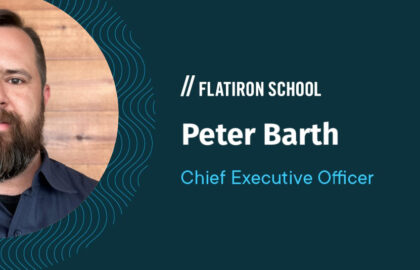Deciding on a first programming language to learn can be overwhelming. We recently hosted an online lecture to help students better understand a few of their options and decide what’s right for them.
Our co-founder and Dean Avi Flombaum also explained why, at Flatiron School, we believe in building a coding foundation with a combination of two languages: Ruby—the welcoming, colloquial language that made Avi fall back in love with code after nearly quitting programming altogether (early C# was that frustrating)—and JavaScript—the language that changed the world (wide web), transforming the internet from static, text-filled pages into the dynamic experience it is today.
He highlighted three reasons for this approach:
1. To make you more a versatile developer.
“I don’t get the value of knowing just one language,” Avi says. “I want the right tool for the job. If you only know one language, you’re pigeonholing yourself into using one approach for everything.”
2. To hone the skill of learning new languages.
Working as a developer, you will need to learn new languages (maybe even as early as your first day on the job). Learning more than one language—and starting to recognize patterns, abstractions, and commonalities between languages—at the beginning of your coding education better prepares you to continue learning new languages in the future.
3. To get you ready for your first job and a lifelong career as a developer.
Learning both languages opens up more immediate job options for your first job as a developer, and prepares you to keep on learning new languages and technologies as the job market and tech landscape evolve. “The most consistent thing in technology is that everything is going to change,” Avi states. “Eventually, you will need to know more than one language if you want to have an awesome career and build deep, meaningful things. So, why wait?”
Interested in a deeper exploration of the differences between the languages and how they complement each other? You can view the full online lecture below
This online lecture sparked so much interest in attendees that we’re doing a second one to get even deeper into discussion about Ruby and JavaScript and have more time for audience questions. Mark your calendars for Thursday, July 21 at 1pm EST!




